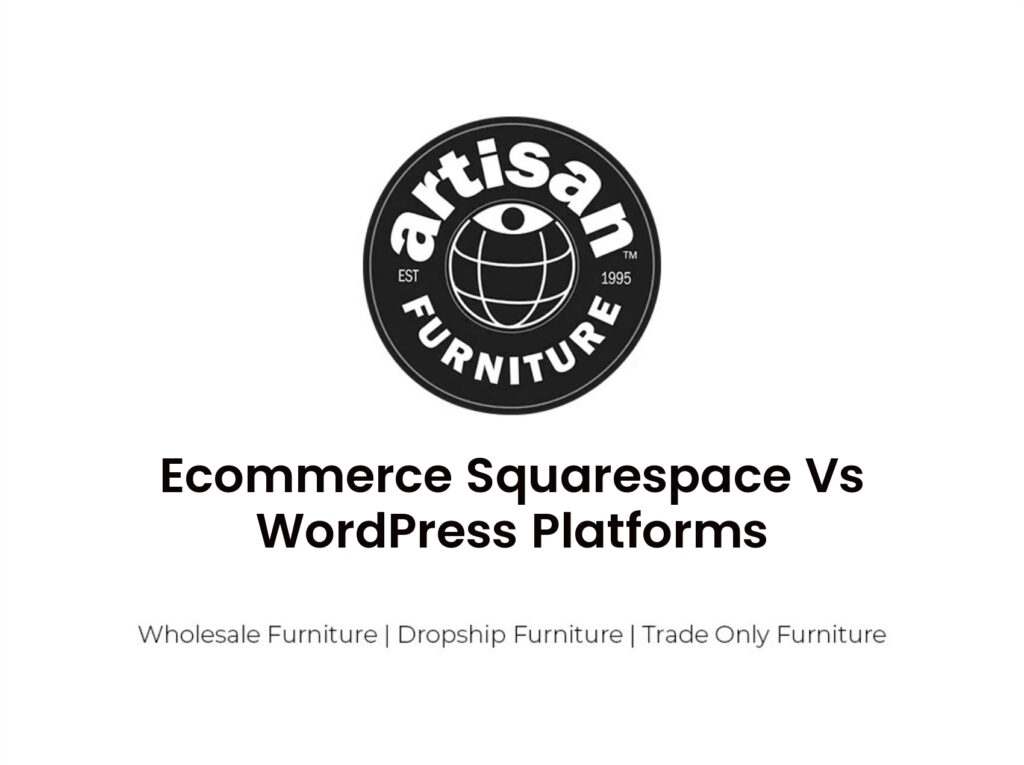Ecommerce Squarespace Vs WordPress Platforms
In the bustling realm of ecommerce, the choice of platform can make or break a business. Squarespace and WordPress stand as prominent contenders, each with their own unique strengths.
Squarespace, with its user-friendly interface and convenience, appeals to those seeking a hassle-free website creation experience.
Conversely, WordPress offers unparalleled customization and adaptability, catering to the needs of content-heavy websites.
This article explores the key differences between these platforms, enabling you to make an informed decision that aligns with your ecommerce aspirations.
Table of Contents
ToggleEase of Use and Quick Website Creation
Squarespace is a user-friendly platform that allows for quick and easy website creation, making it ideal for beginners. With its intuitive drag-and-drop website builder, users can create a professional-looking website without any coding skills. The platform offers a variety of stunning and customizable designer templates, giving users the flexibility to create a unique and visually appealing website. Squarespace also provides transparent pricing plans, ensuring that users know what they are getting and how much they are paying for it.
When it comes to ecommerce, Squarespace shines with its built-in sales features. Users can easily set up an online store, manage inventory, process payments, and track orders all from within the platform. This makes it a convenient and efficient option for those looking to start an online business.
In addition to its ease of use and quick website creation, Squarespace also offers top-of-the-line marketing support. Users have access to powerful SEO tools, social media integrations, and email marketing capabilities, allowing them to effectively promote their website and drive traffic to their online store.
Customization and Flexibility
WordPress offers extensive customization options and greater flexibility in design customization. With WordPress, users have the ability to fully customize their websites to meet their specific needs and preferences. Whether it’s changing the layout, colors, fonts, or adding custom functionality, WordPress provides the tools and flexibility to make it happen.
One of the key advantages of WordPress over Squarespace is the ability to access a wide range of third-party plugins. These plugins allow users to enhance their websites with additional features and functionalities, such as e-commerce capabilities, social media integration, SEO optimization, and more. This level of customization and flexibility is especially beneficial for businesses or individuals with specific requirements that may not be readily available in Squarespace’s built-in features.
In terms of design customization, WordPress allows users to have complete control over the appearance of their websites. This includes the ability to edit and customize the code directly, giving users the freedom to create unique and personalized designs. However, it’s important to note that this level of customization typically requires some knowledge of coding or hiring someone with coding skills.
Comparison of Features and Pricing
When comparing Squarespace and WordPress for ecommerce platforms, it is important to consider the differences in features and pricing.
Squarespace offers transparent pricing plans and a user-friendly platform, making it a great choice for beginners.
On the other hand, WordPress provides more customization options and flexibility, but requires coding skills or hiring someone who does.
Pricing Differences
Highlighting the key distinctions in features and pricing, a comprehensive comparison of the pricing differences between Squarespace and WordPress platforms can be made.
When it comes to pricing, Squarespace offers a transparent pricing structure with monthly plans that range from $12 to $40. These plans include hosting, domain registration, and customer support.
On the other hand, WordPress is an open-source platform, meaning it is free to use. However, users will need to pay for web hosting, domain registration, and additional features such as themes and plugins. The cost of these services can vary depending on the user’s needs and preferences.
Therefore, while Squarespace provides a simplified and all-inclusive pricing model, WordPress offers more flexibility but requires additional expenses for hosting and customization.
Ultimately, the choice between the two platforms depends on the user’s budget and specific requirements, such as the need for advanced customization or integration with wholesaling suppliers for home furniture.
Feature Comparison
To provide a comprehensive analysis of the features and pricing, let’s delve into the comparison between the features offered by Squarespace and WordPress platforms.
When considering dropshipping or selling home decor products, both platforms have their strengths.
Squarespace is known for its ease of use and beginner-friendly interface. With its drag-and-drop website builder and intuitive template editor, creating a visually stunning website is a breeze. Squarespace also offers built-in sales features, making it a great choice for ecommerce.
On the other hand, WordPress offers more flexibility and customization options. With access to a wide range of third-party plugins, WordPress allows for powerful SEO tools and extensive design customization. However, WordPress does require coding skills or hiring someone who has them.
Ultimately, the choice between Squarespace and WordPress depends on your level of expertise and specific needs for your dropshipping or home decor business.
Value for Money
Both Squarespace and WordPress offer a range of features and pricing options, making it essential to compare their value for money.
Squarespace is known for its user-friendly platform and drag-and-drop website builder, which allows for quick and easy website creation without any coding skills required. It also offers transparent pricing plans and top-of-the-line marketing support.
On the other hand, WordPress is better known for its customization options and flexibility. It supports large, content-heavy websites and provides complete customization options through coding or third-party plugins.
While Squarespace may be easier to use with its drag-and-drop builder, WordPress offers more flexibility in terms of pricing and a wider range of in-built features.
Ultimately, the choice between the two platforms will depend on the specific needs and preferences of the user.
App and Plugin Functionality
When it comes to app and plugin functionality, Squarespace and WordPress have different strengths.
Squarespace has an increased app market functionality and seamlessly integrates important apps.
On the other hand, WordPress offers thousands of plugins for extra functions, although it is important to be cautious of outdated and poor quality plugins.
Ultimately, the choice between the two platforms depends on the specific needs and preferences of the user.
Squarespace App Market
The Squarespace app market provides a wide range of plugins and functionality that enhance the ecommerce experience for users. With Squarespace, users can easily integrate important apps seamlessly into their websites, allowing for increased functionality and customization.
The app market offers various tools for sales, marketing, analytics, and more, making it easier for ecommerce businesses to manage their online stores. Squarespace’s app market is designed to meet the needs of beginners and experienced users alike, with user-friendly features and intuitive interfaces.
WordPress Plugin Variety
Offering a wide range of options, WordPress boasts a diverse variety of plugins that enhance both app and plugin functionality for users.
With thousands of plugins available, WordPress users have the ability to customize their websites and add extra features to meet their specific needs.
These plugins cover a wide range of functions, including SEO optimization, social media integration, e-commerce capabilities, and much more.
However, it is important to exercise caution when choosing and installing plugins, as some may be outdated or of poor quality.
It is recommended to research and read reviews before adding any plugins to ensure they are reliable and secure.
Maintenance and Security
Squarespace requires very little ongoing maintenance and manages all updates and security for you. This is an attractive feature for those who desire a hassle-free website management experience. With Squarespace, you can focus on creating and promoting your content, without worrying about the technical aspects of maintaining a website.
On the other hand, WordPress requires frequent maintenance, especially after updates. This means that you need to regularly update your plugins, themes, and core files to ensure the security and functionality of your website. Additionally, WordPress puts the responsibility of website security on you. You need to take measures such as installing security plugins, implementing strong passwords, and regularly backing up your website to protect it from potential threats.
By using Squarespace, you can have peace of mind knowing that your website is being taken care of. Squarespace manages all updates and security measures for you, so you can focus on other important aspects of your business. Moreover, Squarespace does not gain any rights over your content, ensuring that your intellectual property remains protected.
Ecommerce Features for Dropshipping and Wholesale Products
Ecommerce platforms offer a variety of features and options for dropshipping and wholesale products. When it comes to choosing between Squarespace and WordPress, both platforms have their own advantages.
Squarespace provides built-in sales features that make it easier to set up and manage an ecommerce store. It offers features like inventory management, order fulfillment, and secure payment gateways, making it suitable for dropshipping and wholesale businesses. Squarespace also provides a user-friendly interface and intuitive design tools, allowing users to easily showcase their products and create a visually appealing online store.
On the other hand, WordPress offers a wide range of plugins and extensions that can enhance the ecommerce functionality of a website. With the help of plugins like WooCommerce, users can create a fully customized online store with advanced features for dropshipping and wholesale operations. WordPress also provides flexibility in terms of design customization and SEO optimization, which can be beneficial for businesses looking to establish a strong online presence.
Ultimately, the choice between Squarespace and WordPress for dropshipping and wholesale products depends on the specific needs and preferences of the business. Squarespace offers a user-friendly and all-in-one solution, while WordPress provides more customization options and flexibility.
Frequently Asked Questions
Is It Possible to Integrate Third-Party Plugins With Squarespace for Added Functionality?
Yes, it is possible to integrate third-party plugins with Squarespace for added functionality. Squarespace offers an increased app market functionality and seamlessly integrates important apps, making it a suitable choice for those seeking additional features.
How Often Does Squarespace Release Updates and Manage Security for Websites?
Squarespace releases updates and manages website security on a regular basis, ensuring a seamless user experience. By taking care of ongoing maintenance, Squarespace allows users to focus on their business without worrying about technical issues.
Can WordPress Be Used for Small, Simple Websites or Is It Better Suited for Larger, Content-Heavy Websites?
WordPress can be used for small, simple websites, but it is better suited for larger, content-heavy websites. With its customization options and access to third-party plugins, WordPress allows for greater flexibility and scalability in design and functionality.
Are There Any Limitations to the Customization Options on Squarespace?
Squarespace offers a wide range of customization options, allowing users to create unique and visually stunning websites. However, there may be limitations in terms of advanced coding and customization options compared to WordPress.
Does WordPress Offer Built-In Sales Features for Ecommerce Websites or Is It Necessary to Use Plugins for This Functionality?
WordPress does not have built-in sales features for ecommerce websites. However, there are numerous plugins available that provide this functionality. One popular plugin is WooCommerce, which offers a comprehensive set of tools for creating and managing an online store.



